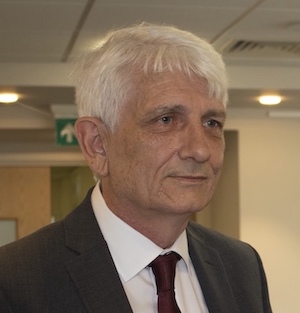
Consultant with over 30 years of experience in environmental and water management.
Patrick is an Irish national who is regularly employed as a Team Leader with extensive experience in international projects focused on river basin management planning and the implementation of EU water-related legislation. Well-versed in landfill solid waste management, anaerobic treatment of agricultural, municipal and industrial wastewater, Microbial Enhanced Oil Recovery (MEOR), and the environmental fate and effects of surfactants. In addition to these specialised areas, Patrick manages a website design service, provides guidance to inventors, and collaborates with clients to solve both technical and non-technical challenges.
Professional Experience
Reverse Chronological Order
Support to Implementation and Monitoring of Water Management in Montenegro
November 2019 - November 2024
Position: Team Leader
Contracting Authority: Public Works Administration, Montenegro
Contract Value: 3,500,000 Euro
Beneficiaries: The Ministry of Agriculture, Foresty and Water Management (MAFWM) & Ministry of Ecology, Spatial Planning and Urbanism (MEPSU)
Financing Agency: EU
Consortium: Eptisa, Safege (Serbia)
Purpose: To strengthen the institutional, administrative and monitoring capacities of the Montenegrin water management sector institutions in order to improve environmental protection.
Outputs: EU Directives (Bathing Waters, Floods, Nitrates and Marine Strategy Framework) are fully transposed and proposed activities are fully implemented; Monitoring capacities of the national institutions responsible for water management are strengthened. Implementation plans prepared for EU Water Framework Directive and EU Drinking Water Directive. Design of a Multi-Purpose Research Vessel and Tender Documentation prepared.
Skadar Lake Without Chemical Pollution - Solution (Montenegro)
June 2021 - July 2023
Position: Data Management and Environmental Risk Assessment Expert
Financing Agency: EU under Cross Border Cooperation Programme Montenegro - Albania 2014-2020.
Consortium: Centre for Ecotoxicological Research LLC, Univeristy of Tirana, Green Centre Albania Association, Shkoder.
Beneficiaries: Public authorities at central and local level; Other institutions/organizations involved in the environmental protection.
Purpose: To support shared and coordinated hazardous chemical substances research in Skadar Lake cross border area.
Outputs: Environmental risk assessment of chemical pollution in the transboundary Skadar lake and determination of pollution hot spots conducted.
Strengthening Capacities for Implementation of the EU WFD in Montenegro
February 2017 - January 2020
Position: Team Leader
Contracting Authority: Delegation of the European Union to Montenegro
Contract Value: 1,400,000 Euro
Beneficiaries: The Ministry of Agriculture and Rural Development (MARD)
Financing Agency: EU
Consortium: Suez, Eptisa (Serbia)
Outputs: River Basin Management Plans for the Adriatic River Basin and the Danube River Basin in Montenegro.
Development of Management Plans for the Drini-Buna and Semani River Basins in Albania
April 2016 - March 2018
Position: Team Leader
Contracting Authority: The Ministry of Agriculture and Rural Development
Contract Value: 1,200,000 Euro
Beneficiaries: The Ministry of Agriculture and Rural Development
Financing Agency: World Bank/Sida
Consortium: Mott MacDonald (Albania), Abkons (Albania), DHI (Denmark)
Outputs: River Basin Management Plans for the Drini-Buna River Basin and the Semani River Basin in Albania
Strengthening the Institutional Capacities for water management in North Macedonia
September 2014 - December 2015
Position: Key Expert - Component Leader / RBM Expert
Company: Ramboll (Denmark)
Project Involvement: Leading the component to provide inputs to the assessment of the current administrative structure and its capacity to effectively implement the water management legislation with its specific focus on EU-WFD and to support development of the initial elements of the River Basin Management Planning of Vardar River. I also worked on the development of suitable and implementable organisational options for strengthening the water management structures of the project beneficiary country.
Strengthening of Environmental Institutions and Preparation of Pre-Accession Funds in BiH
March 2012 - July 2014
Position: Key Expert
Company: Eptisa (Spain)
Project Involvement: The objective was to strengthen the administrative structures and foster the approximation process and support implementation of the EU Environmental Acquis (including relevant EU water policies, WFD and other water directives). My responsibilities included leading the water management component for strengthening technical and IPA-compliant planning capacities of the institutions involved in environmental and water management in BiH to achieve EU environmental and water standards. I also assisted in the production or relevant documents in order to support implementation of EU-WFD requirements namely through development of Directive Specific Implementation Plans for the water sector ‘Heavy Investment Directives’ (Urban Waste Water, Drinking Water, Flood management).
Kagera River Basin integrated watershed management program, Rwanda
February 2011 - July 2011
Position: Team Leader
Contracting Authority: World Bank
Company: Water Resource Associates (UK)
Project Involvement: The objective was to define the status of environmental degradation in the Kagera River Basin and identify interventions to reverse degradation and an appropriate institutional set up for project implementation on national and transboundary levels.
Environmental and Natural Resource Management Action Plan, Malawi
July 2010 - December 2010
Position: Team Leader
Contracting Authority: Millennium Challenge Corporation
Contracted by: Water Resource Associates (UK)
Beneficiaries: Millennium Challenge Account - Malawi, Ministry of Agriculture, Ministry of Environmental Affairs, Ministry of Irrigation and Water Development
Contract Value: 1,200,000 USD
This project was carried out in conjunction with MCC in Washington and MCA-Malawi, LTS Ltd, in partnership with The International Union for Conservation and Nature (IUCN), the Centre for Development Management (CDM) and Water Resource Associates (WRA), to develop an Environmental and Natural Resource Management Action Plan (ENRMAP) for the Upper Shire River Basin, with a focus on the East and West Malombe catchments.
Development of water EQOs for the Orange-Senqu River System, South Africa
July 2009 - December 2009
Position: Key Expert
Contracting Authority: EuropeAid/125153/D/SER/Multi African Transboundary River Basin Support Programme – case of the basin of the Orange-Senqu River in Botswana, Lesotho, Namibia and South Africa.
Project Involvement: Preparation of a framework for the development of recommendations to support the management of water environmental quality for the Orange-Senqu River System, and to develop water resource management objectives to support this process.
Scott Wilson Ltd (UK)
January 2008 - December 2008
Position: Associate Director
Duties: Acting as bid manager for a range of proposals related to international transboundary water management. Responsibilities included the identification of projects, the development of project consortia, the development of Expressions of Interest and the coordination and delivery of proposals.
Technical Assistance for Water Quality Management of Arda River, Bulgaria
March 2007 - September 2007
Position: Team Leader
Contracting Authority: EU PHARE
Contracted by: ARCADIS Euroconsult (Netherlands)
Contract Value: 500,000 EURO
Leading the project to achieve the objective to establish partnership between the stakeholders of Bulgaria and Greece based on the EU standards for integrated WRM according to the EU WFD 2000/60/EC and other EU water directives as well as increase the capacity regarding strategic planning to improve the quality of Arda River. The project, furthermore, supported preparation of the implementation programme of the acquis with particular emphasis on water quality in respect of the Directive 2000/EEC for establishing of framework for Community action in the field of water policy and of the Convention on protection and use of the cross-border water. The project also provided a programme for monitoring of the Arda River water quality and for reservoirs water; increasing the capacity regarding strategic planning for improving the quality of Arda River according to the requirements of the WFD; Strengthening administrative, monitoring and enforcement capacity at different levels, with the accent on regional and local levels.
Improvement of the Management of the Vardar River Basin, North Macedonia
January 2006 - November 2007
Position: Team Leader
Contracting Authority: European Agency for Reconstruction, Skopje
Contracted by: Euroconsult Mott MacDonald (Netherlands)
Contract Value: 1,000,000 EURO
Assisting in the process of improving the quality of water resources shared by Greece and the former Yugoslav Republic of Macedonia, i.e. the Vardar river and the Dojran lake, so as to progress towards compliance with the EU Water Framework Directive.
Integrated Management of the Waters of Mesta/Nestos River Basin, Bulgaria
June 2005 - October 2005
Position: Team Leader
Contracting Authority: EU-PHARE
Contracted by: Project Management Ltd (Ireland)
Contract Value: 400,000 EURO
Developed the main elements of the draft River Basin Management Plan for Mesta River Basin in accordance with the requirements of the Water Framework Directive 2000/60/EC focused on the river basin characteristics, preliminary pressure and impact analyzes and GIS development. (i) assessment of the basin characteristics (ii) technical capacity building and assessment of the staff of the local River basin Directorate, (iii) Gaps in data, technical and HR critical for the further implementation of the requirements of the WFD and identification of main RBM issues, and (iv) Strategic capacity building, and management support to the Joint Coordinating Body of the Mesta/Nestos River Basin, formed under the INTERREG LLLA A – PHARE CBC Greece – Bulgaria. Project included cross-border counterparts ’coordination through: common technical approach to the requirements of WFD, durable lines of communication and management frame between responsible regional Bulgarian and Greek Basin authorities, common agreed water quality objectives as well as common programs of measures within the Mesta/Nestos River Basin Management Plan as part of bilateral agreement between the two countries.
UNDP/GEF Black Sea Ecosystem Recovery Project
April 2002 - April 2005
Position: Chief Technical Advisor (P5) / Project Coordinator
Contracting Authority: GEF / UNDP
Contracted by: UNOPS
Contract Value: 4,000,000 USD
The project (BSERP) supported regional aspects of nutrient control in the Black Sea coastal countries. It also aimed to strengthen the role of the Black Sea Commission to ensure the formulation, adoption, and implementation of a suite of harmonized legal and policy instruments for tackling the problem of eutrophication and release of certain hazardous substances; and to facilitate ecosystem recovery, including through sustainable use of living marine resources.
Halcrow (UK)
July 1999 - January 2002
Position: Senior Water Management Expert
Involved in the following projects:
EU-TACIS Development of Transboundary Co-Operation Water Quality Monitoring and Assessment Bug River Between Belarus and Poland. Main responsibilities included (i) the development of a trans-boundary water information management system between Belarus, Poland and Ukraine; (ii) the designation of environmental quality objectives and standards for the Bug river and support for monitoring system in accordance with the requirements of the EU WFD.
Caspian Sea Environment Programme-CEP (GEF/UNDP/WB/EU). Involved involved in the design of a regional water management and sediment quality monitoring programme and the implementation of environmental quality objectives for water, sediment and biota for the future management in Caspian Sea.
TA for Development of Strategic and Short-term Investment Plans for the city of Rostov, Russia”, funded by (DFID). Provided technical assistance in relation to integrated sustainable water management for the city of Rostov including the study of the impact of pollution sources and a strategic plan for upgrading and expansion of the water services.
EU-TACIS “The updating of Vodokanal’s Environmental Protection and wastewater treatment laboratory facilities in Zaporozhzhia”: Assistance provided to Vodokanal in liaison with donor organisations and the drafting of a proposal for the procurement of equipment and training of staff for procedures of quality control.
The Regional Nutrient Reduction Programme for the Black Sea Basin: Implemention of new policies, institutional and regulatory measures for nutrient reduction, Implementing investment projects for water pollution, Capacity building for water pollution management including monitoring systems, Adopting of legal mechanisms at national and regional level to control nutrient releases to the Black Sea. My responsibility involved the review of policy and legislation for regional protection of surface waters from nutrients and the development of Black Sea ecosystem indicators and the environmental status framework.
Advisor for the development of Environmental Risk Assessment for a Costal Realignment Scheme for UK Environmental Agency. The study involved the use of environmental risk assessment procedures to determine the present and future impact of agrochemicals to surface waters and coastal habitats.
WRc plc (UK)
April 1991 - June 1999
Position: Water Management Expert
Involved in the following projects:
Black Sea Environnent Programme - EU TACIS/ GEF/ UNDP. The purpose of the Programme was to strengthen and create regional capacities for managing the Black Sea water and ecosystem, develop an appropriate policy and legislative framework.
Assessment of the Environmental Code of Conduct proposed by the Detergent Agency (EC DG III-Industry)
Improvements to the EU Legislation for Surfactants in Detergents that May Pose a Risk to Surface Waters (EC DG III)
Effects of Atmospheric Pollution on a Front Line Species (internally funded by WRc plc).
Landfill 2000 – A Field trial of Accelerated Stabilisation (funded by DoE, UK)
Landfill Codisposal and Gas Flux Studies (funded by DoE, UK)
Landfill Codisposal and Gas Flux Studies (funded by DoE, UK)
Anaerobic Treatment of Industrial and Municipal Wastewater (UK)
December 1989 - March 1991
Employer: University of Essex, UK
Position: Postdoctoral Researcher
This study was designed to investigate the effect of high sulphate concentrations, which may be present in landfill leachates. The study was commissioned by the UK Department of Environment (now Defra) who needed to understand the impact of elevated sulphate levels in landfill leachate, which would be expected to occur if coal containing high sulphate levels was imported from outside of the UK, and the disposal option for the processed coal waste (to remove sulphate) was co-disposal with household and/or industrial waste in landfill. This work investigated the treatability of landfill leachate with elevated sulphate and heavy metals by anaerobic digestion, comparing methanogenic with sulphate-based digestion, in upflow anaerobic digesters where biomass was retained as biofilms on support material.
Enhancement of Oil Recovery Using Subsurface Microorganisms (USA)
October 1987 - November 1989
Employer: University of Oklahoma, USA
Position: Postdoctoral Researcher
Contracting Authority: U.S. Environmental Protection Agency
Efficient and economical treatment of contaminated subterranean formations by in situ bioremediation process is under investigation. These processes involve injection of specific nutrients into the subsurface to stimulate bacterial populations involved in transformation and/or mineralization of potentially toxic compounds. The success of such processes depends on a fundamental understanding of the factors that influence the propagation, growth, and movement of bacteria within porous subsurface formations. In flow systems, bacterial transport through porous media has been largely described as a function of the porous entrance size and, hence, adequately simulated by a filtration model. Under static conditions, however, it is known that a relationship between the bacterial penetration rate and the subsurface permeability exists. Furthermore, a penetration mechanism based entirely on motility has previously been derived which successfully predicts penetration times for a motile bacillus strain growing within Berea sandstone.
Although motility was an important mechanism for bacterial penetration in this case, it was unknown whether other characteristics of motility, i.e., random or nonrandom movement, were also important. Directional or nonrandom movement is usually thought to occur only in chemotactic strains, since non-chemotactic mutants are known to move randomly. Nonmotile bacteria have also been shown to penetrate consolidated sandstone cores, although their penetration rates were considerably slower than that found in motile bacteria. The mechanisms by which nonmotile bacteria penetrate porous media were not known. The aims of this study were to determine the biological factors which govern the movement of motile and nonmotile bacteria through unconsolidated porous media. To answer these questions, we compared the penetration times of Eschericia coli mutants defective in chemotaxis, flagellar synthesis, and gas production under anaerobic conditions.
For motile strains, the penetration rate decreased with increasing galactose concentrations in the core and with decreasing inoculum sizes. Also, motile strains with the faster growth rates had faster penetration rates. These results imply that, for motile bacteria, the penetration rate is regulated by the in situ bacterial growth rate. A sigmoidal relationship was found between the specific growth rates of all of the motile bacteria used in this study and the penetration rates through cores saturated with galactose-peptone medium.
This research was supported under contract CR-813559 from the U.S. Environmental Protection Agency, under the supervision of Professor Michael McInerney at the University of Oklahoma.
Ph.D Thesis: "Support Matrix and Feed Flow Effects in Anaerobic Fixed-Bed Reactors" (Ireland)
October 1983 - July 1986
My studies were completed under the supervision of Professor Emer Colleran (RIP) at the University College Galway, Ireland in 1987. This involved examined the relationship between the potential for methane production in anaerobic digesters operated using agricultural waste in the following ways:
- Upflow - Fixed Film Packed Reactor
- Upflow Hybrid/Sludge-Bed Fixed Film - Effect of varying the matrix quantity
- Downflow Fixed Film
Anaerobic reactors were studied for optimisation in:
- Start-up phase
- Long term operation
- Methanogenic activity in attached and non-attached sludges
- Liquid flow dispersion
During my research, I developed and improved upon specific methanogenic activity tests that existed during the 1980s. These included the cofactor F420 assay and the measurement of specific methanogenic potential of sludges.
Search For Scientific Publications
List of Sites Searched
- academia.edu
- doaj.org/article
- datadryad.org
- eric.ed.gov
- iopscience.iop.org
- journals.plos.org
- mdpi.com
- papers.ssrn.com
- pubs.acs.org
- pubs.rsc.org
- scholar.google.com
- sciencedirect.com
- scienceopen.com
Education
BSc. Microbiology
Cardiff University, Wales
1979 - 1983
Ph.D (Anaerobic Digestion)
Galway University, Ireland
1983 - 1986
Project & Contract Management
EMAS
1992
Innovation & Technology
Open University, UK
1996 - 1997
Guide to Invention
10 Step Guide for Inventors
I have created a website to provide the equivalent of a workshop manual for inventors to evaluate, protect, develop and profit from their ideas. The essential aspects of invention are divided into 10 projects, each with a checklist to help inventors turn each project into practical activity. All links below are directed to the Guide for Inventors website.

Is your idea really an invention?
To be an invention, your idea must contain at least one original inventive step.

Competition & market potential
Thinking of your idea not as an invention but as a business opportunity starts here.

Grow it – or throw it?
You must decide whether there’s enough justification to take your idea any further.

Proving your idea
To prove that your inventive step works requires increasingly polished prototypes.

Protect your idea & yourself
Legally protect your intellectual property (IP) so that you can safely disclose it, profit from it and defend it.

Exploitation routes
You have 3 choices: royalties from a company (licensing), or become an entrepreneur, or form a joint venture.

Raising people and finance
This Project is about improving the resources available to help you exploit your idea.

Business or project plan
Producing one isn’t many people’s idea of fun, but there are some things you just can’t do without.

Finding companies
The first step for a licensing deal is finding the right companies to approach.

Dealing with companies
If you’re aiming for a licensing agreement with a company, this is the last lap.
Sustainability
Sustainable Development
My approach to sustainable development emphasises the crucial role of global knowledge transfer as a driving force in achieving all 17 Sustainable Development Goals (SDGs). By fostering the sharing of knowledge, innovations, and best practices across countries, we can address complex challenges and accelerate progress toward sustainability. To define key strategic initiatives where knowledge transfer can make the greatest impact, I have conducted a detailed regional analysis structured as follows:
- Comprehensive SDG Overview: A comprehensive examination of each goal, detailing its objectives, interrelations with other SDGs, specific targets, and the latest progress. Data is systematically presented through structured tables, maps, and charts to ensure clarity and accessibility.
- Targeted Insights & Challenges: For each SDG, I assess current progress, common obstacles, strategies for overcoming challenges, essential implementation requirements, key stakeholder contributions, and noteworthy initiatives with case studies.
- Strategic Initiatives: Existing approaches to tackle common challenges are examined together with identification of future key initiatives that can accelerate progress toward SDG targets in different countries.
- Sustainable Practices Across Sectors: Key sectors—including agriculture, construction, energy, industry, waste management, transport, and water—are analysed to highlight sustainable practices. IPCC data is integrated into the agriculture and energy sections. Dedicated pages explore specialised topics such as blockchain for SDGs, plastic pollution, and smart cities, with direct links to relevant SDGs and supporting data on current trends. Additional resources include explanatory videos, sustainability-related patents, and global sector news updates.
- Beyond 2030 - A Future-Focused Approach: The outline of a post-2030 strategy for SDGs is included, evaluating ongoing progress while addressing the challenges of transitioning away from fossil fuel dependency. A detailed energy crossover strategy outlines short-, medium-, and long-term objectives for a sustainable energy future.
Other Work
Website Design
The key step in designing a website is understanding a clients requirements and their perceptions of the type of website that they would like to have, and most importantly, what they would like included. I explain clearly what is required and what costs are involved in order to design the website. There is no need for any complicated computer speak. I keep things simple, clear and understandable so that my clients can make informed decisions.
News Feeds
Latest News
Add any of the news streams below to your newsfeed reader app
Main Hobby
Get in Touch